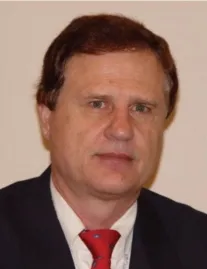Mercator-Fellow
Prof. Helmut Baumgart

Dr. Baumgart’s principal research interest focuses on the study of electronic materials and their device applications in microelectronics and thermoelectric devices for renewable energy and biomedical science applications. His most recent research interests include: Surface Anchored Metal-Organic Framework (SURMOF) Films and the correlation of their electronic characteristics and their microstructural properties with device performance. Furthermore he researches Thermoelectric Materials and thermoelectric devices based on quantum well superlattices in porous Si templates for waste heat recovery; Nonvolatile Memristive RRAM Memory Devices, VO2 Phase Change Material for thermochromic and memory applications; Hybrid Organic/Inorganic Photovoltaic Cells, Thin Films for Superconducting Radiofrequency (SRF) Technology. He has authored and co-authored 162 articles, holds 17 patents, edited and published 16 Electrochem. Soc. Conference Proceedings Volumes, organized 17 International Conferences, held 200 + conference presentations, included are invitations for 30 invited talks and plenary session talks.
Compelling Short Description of the Contemplated Role of Mercator Fellow within COORNETs SPP 1928
In his role as Mercator Fellow Dr. Baumgart’s main responsibility is to perform electrical characterization of various MOF thin films with the tool set of a semiconductor electronics laboratory as well as to investigate the potential of test devices with coordination networks as active electronic layers utilizing the semiconductor test equipment at Old Dominion University’s Applied Research Center at Thomas Jefferson National Accelerator Labs and the National Institute of Standards and Technology (NIST) in Gaithersburg, Maryland. Dr. Baumgart’s research group offers a platform for electrical characterization of Metal-Organic Frameworks (MOFs) as representative subset of Coordination Networks (COORNETs) that includes Seebeck measurements, Hall Effect Measurements, I-V, electrical conductivity (e.g. 2 and 4 Point Probe measurements), etc. as well as thermal conductivity including use of facilities at the National Institute of Standards and Technology (NIST) in Gaithersburg, Maryland. This cooperation with the Mercator Fellow is open to all COORNET partners that have interests and concerns in this area. In addition, he will spend one to two months per year at the Institute of Functional Interfaces at KIT, in order to intensify the regular exchanges for the duration of the SPP 1928. That will include working visits at the University of Oldenburg and participation in COORNETs workshops and biannual meetings.
Prof. Hiroshi Kitagawa

Dr. Kitagawa’s research interest has focused on the emergence of new molecular devices which have the diversity and flexibility of biological systems is increasingly expected to occur. Although research of the basic concepts of these systems is still underway, he believes that innovative exploration into the fusion of electrons and protons may lead to novel breakthroughs. He studies both quantum mechanical electronic phases (superconducting, magnetic, ferroelectric, metallic and insulating phases) and ionic phases (superionic and quantum paraelectric phases, and tunneling phenomena). To establish a foundation for the design of novel devices, he seeks to utilize the diversity of electronic and ionic states. His central focus is mainly on inorganic compounds which have interesting features. He investigates materials such as: low-dimensional strongly correlated electron systems; mixed valence compounds with a strong negative U-interaction; charge transfer compounds; metal-organic frameworks; nanoparticles; organic conductors; hydrogen storage materials; superionic conducting materials; etc. He is now a Research Director of Science and Creation of Innovative Catalysts, PRESTO, JST. His research fields are solid-state chemistry, coordination chemistry, nano-science, low-dimensional electron system, and molecule-based conductors. He has authored and co-authored more than 350 papers.
www.kuchem.kyoto-u.ac.jp/organization/member/kitagawa_e.html